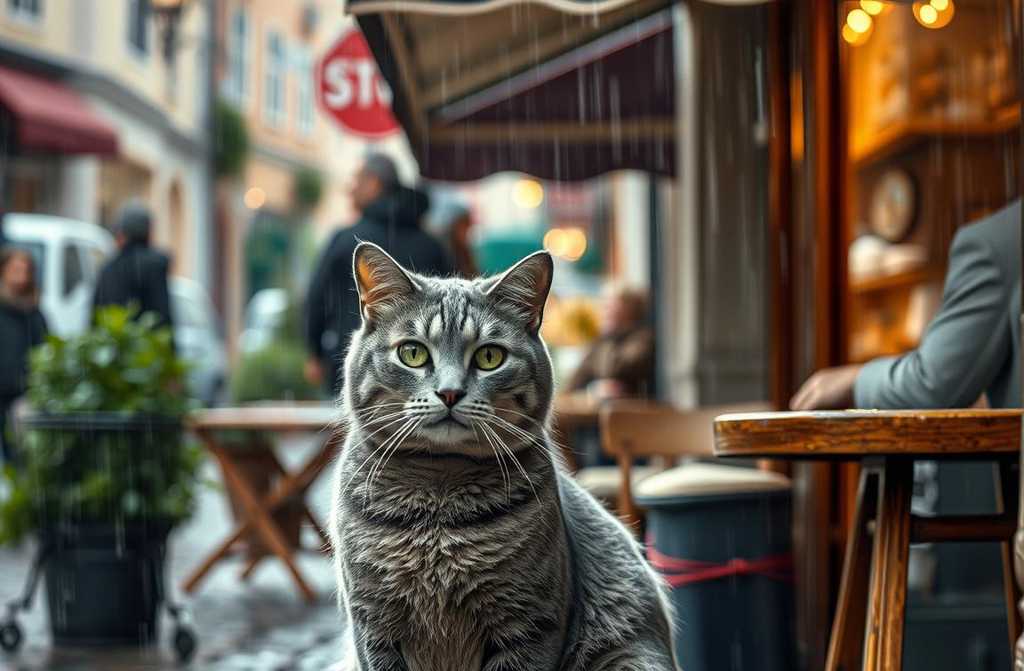З життя
The Cat Who Waited Until the Very End

In a cosy little café tucked away on Burton Street, squeezed between old red-brick houses and narrow alleyways, there was barely enough room for a handful of tables. Outside, its window display was simple: a few croissants in a glass cabinet, some bookshelves filled with well-worn novels left by old friends, and an antique gramophone playing soft, melancholic jazz that wrapped the place in a warm, nostalgic glow. But what caught everyones eye wasnt the smell of freshly ground coffee or the pastriesit was the grey tabby cat who always sat by the entrance, staring at the door.
“Thats Oslo,” the owner, Miriam, would say. She was a woman with silver hair cascading in gentle waves over her shoulders and hands that moved with quiet care. “And hes waiting.”
Most assumed Oslo was just another stray whod claimed a spot and made himself at home. But the regulars knew better.
Five years earlier, on a cold, drizzly afternoon, Miriam and her husband, Andrew, had found him. The cat had appeared on their doorstep, scrawny and limping, mewing softly, almost pleading. Without hesitation, Andrew scooped him up, wrapped him in an old blanket, treated his injured leg, and settled him on the worn-out sofa in their tiny kitchen.
“This ones staying,” Andrew had said that night, watching Oslo curl up. “Hes got a look about himlike hes the one doing *us* a favour.”
From then on, Oslo became the heart of the house. He slept between them, climbed onto Andrews lap during newspaper readings, purred through evening chats, and every morning, hed walk Andrew to the door when he left for work. He knew when someone was sad and would press against their legs like a silent little guardian, understanding without words.
But everything changed when Andrew fell ill. The sickness was swift and brutalcancer, with no chance of fighting it. Miriam closed the café for months, staying by his side, trying to keep him strong. Oslo rarely left the bed, as if he knew his human needed him. Whenever Miriam stepped out for errands or doctor visits, the cat would sit by the door, staring out as though waiting for something unseen.
When Andrew passed, Miriam felt like a part of her had gone with him. She reopened the café, working alone, but Oslo stayed by the entrance, quiet and steadfast, still watching the door.
“Its like hes waiting for him,” Miriam whispered to a regular one evening. “Every day at five, when Andrew used to come back from his walk.”
Years slipped by. New customers didnt understand why the cat always gazed at the door, while others simply nodded and gave him a pat as they passed. He never demanded attention, never meowed unnecessarilyhe just sat and waited. His loyalty became local legend, and even the neighbourhood kids knew: if you wanted to see patience in its purest form, you went to Oslo.
One particularly chilly autumn, Oslo slowed down. He slept more, ate less, and his bright green eyes grew heavy with quiet weariness. Miriam wrapped him in her old shawl and whispered into his ear, “You can rest now, love. Andrew would be so proud of you.”
The rainy day mirrored the one theyd first met him. Miriam felt the bite in the air and, peeking into the hallway, found Oslo still. Hed passed in his sleep at five oclockpeaceful, like a true guardian of the home.
She closed the café for a week, unable to face the emptiness. When she returned, a small wooden plaque hung by the entrance, carved with simple words:
*”She waited for you out of love. And we learned to love by waiting.”*
Since then, customers brought flowers, notes, and little drawings of cats, leaving them by the door. Some came just to sit by the plaque and think about devotion. Whenever it rained, someone would glance into the hallway, almost expecting Oslo to reappearsilent and loyal, that tiny keeper of love.
Miriam kept running the café. She often sat by the window, staring at the empty spot where Oslo used to be, remembering how hed filled the rooms with warmth, how hed purred on lonely nights, how hed stitched their hearts together when she and Andrew laughed or read side by side.
People came with storieshow Oslo had helped them through breakups, illnesses, losses. He became a symbol: love and loyalty dont need words. They exist in quiet corners, even when what were waiting for never comes.
Miriam thought of Andrew often. “Hed be so proud of how Oslo kept us all together,” shed murmur. And in those memories, it never felt like the cat had really left. He was just waiting. Waiting until the end.
Years later, the little café on Burton Street wasnt just a place for coffee. It was a refuge for anyone seeking warmth, for stories shared, for those who believed animals could teach us something real about patience, faithfulness, and love.
Oslo wasnt in the hallway anymore, but he lingeredin every corner, in every purr of memory, in the quiet warmth his devotion left behind.
Because some animals dont vanish. They just wait from another placesilent, steadfast, those tiny guardians who teach us to love, to wait, and to believe.
And whenever it rains on Burton Street, someone still pauses, glances into the empty hallway, and for just a moment, imagines Oslo sitting there, waiting just like he always did.

















